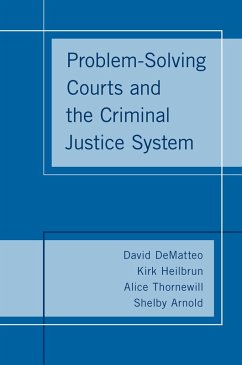
The Sequential Intercept Model and Criminal Justice (eBook, PDF)
Promoting Community Alternatives for Individuals with Serious Mental Illness
Redaktion: Griffin, Patricia A.; Schubert, Carol A.; Dematteo, David; Mulvey, Edward P.; Heilbrun, Kirk
Versandkostenfrei!
Sofort per Download lieferbar
43,95 €
inkl. MwSt.

PAYBACK Punkte
22 °P sammeln!
The number of individuals with severe mental illness in the criminal justice system is shockingly high. However, there is a wealth of research that shows that the traditional incarceration model is not effective with this population, and that many of these individuals can be helped in the community at less cost without increased risk to public safety by addressing their risk-relevant needs and improving their opportunities for recovery. As a result, during the last decade there has been an increasing interest in community-based alternatives to incarceration for individuals with severe mental i...
The number of individuals with severe mental illness in the criminal justice system is shockingly high. However, there is a wealth of research that shows that the traditional incarceration model is not effective with this population, and that many of these individuals can be helped in the community at less cost without increased risk to public safety by addressing their risk-relevant needs and improving their opportunities for recovery. As a result, during the last decade there has been an increasing interest in community-based alternatives to incarceration for individuals with severe mental illness. The Sequential Intercept Model and Criminal Justice offers an overview of the recent changes in correctional policy and practice that reflect an increased focus on community-based alternatives for offenders. Developed by Drs. Mark Munetz and Patricia Griffin, the Sequential Intercept Model (SIM) identifies five conceptual points at which standard criminal processing can be interrupted to offer community-based alternatives: (1) law enforcement/emergency services; (2) initial detention/initial court hearings; (3) jails/courts; (4) re-entry; and (5) community corrections/support. This volume describes the SIM in detail and reviews empirical evidence for each of its five points of interception. Chapters focus on its implementation, starting with an analysis of the national and state-level initiatives, then addressing specific challenges. A final section suggests how the SIM might be applied successfully to other populations (e.g., veterans, juveniles, and those with developmental disabilities). This volume will appeal to policy makers who are considering community-based alternatives, practitioners who carry out these changes, and program evaluators who seek to document the impact of such changes.
Dieser Download kann aus rechtlichen Gründen nur mit Rechnungsadresse in A, B, BG, CY, CZ, D, DK, EW, E, FIN, F, GR, HR, H, IRL, I, LT, L, LR, M, NL, PL, P, R, S, SLO, SK ausgeliefert werden.













